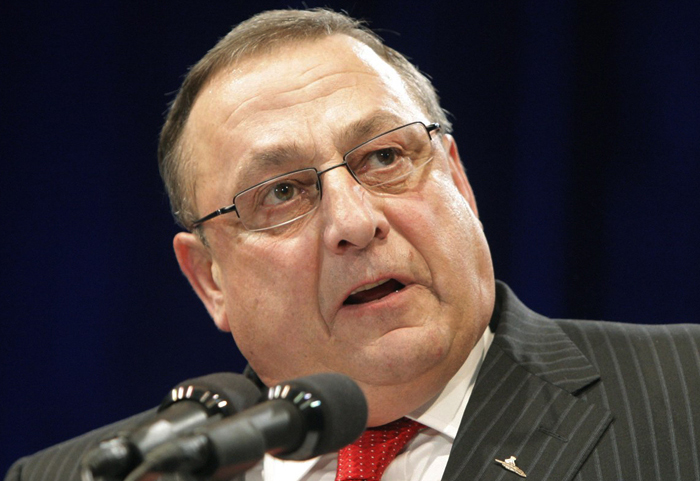AUGUSTA –– Gov. Paul LePage on Wednesday vetoed a bill that would have expanded MaineCare coverage to more than 60,000 low-income Mainers.
The measure also would have established a managed care system for all 320,000 beneficiaries, an effort to control costs in the $2.5 billion program, which is Maine’s version of the Medicaid health insurance program.
Under the Affordable Care Act, also known as Obamacare, the federal government offered to reimburse states for 100 percent of the cost of expansion for at least three years, then gradually reduce reimbursements rates to about 90 percent.
But in his veto message to the Legislature, LePage wrote that Maine could neither afford expansion nor trust the federal government to deliver on its promises.
“The expansion offered through Obamacare would have a disastrous impact on Maine’s budget, as well as those truly needy individuals, our disabled and elderly, who rely today on the scarce resources in our program,” LePage wrote. “Maine has been down this road before, and we must learn from previous experience.”
The Legislature will cast override votes on LePage’s veto, probably later this week, but the voting that sent the bill to LePage’s desk showed that expansion supporters – primarily Democrats – lack the two-thirds majority needed to prevail.
LePage’s veto was expected, as the Republican governor, has been a fierce and consistent opponent of Medicaid expansion, which is a key component of the Affordable Care Act. The federal law was designed to increase health care coverage by mandating that most Americans purchase health insurance.
Many lower- and middle-income Americans qualify for subsidies to help them purchase coverage plans on the health insurance marketplace set up under the ACA. But subsidies are not offered to some of those living at or below 138 percent of poverty level – $15,856 or less for an individual – because the act assumed they would be covered through a nationwide expansion of Medicaid. In Maine, that means approximately 24,000 people will neither be covered by Medicaid, nor qualify for subsidies under the ACA.
However, the U.S. Supreme Court struck down the Medicaid expansion mandate in 2012, leaving it up to individual states to decide if they want to extend coverage to low-income people. Since then a fierce political fight has raged in state houses across the country as opponents and proponents of the Affordable Care Act have poured resources into a debate that may play into the success of the federal health law.
So far, 25 states and the District of Columbia have expanded Medicaid. Twenty-one others, including Maine, have not. Four others are considering expansion.
The federal government has promised to cover 100 percent of the expansion population between 2014 and 2016. Supporters of the law say Maine is losing $1 million a day in federal money by rejecting the law. The reimbursement level is scheduled to gradually draw down to 90 percent by 2022.
LePage added that projected savings through Medicaid were “mirages.”
“It is shortsighted to think federal funds will always be available, especially after watching the federal deficit climb and witnessing continual delays and changes from Washington,” he wrote. When savings were promised in the past as a result of expanding Medicaid, they never materialized, leaving Maine taxpayers holding the bill.”
Medicaid expansion was partially funded in the federal health care law through a reduction in Medicare reimbursements to hospitals. In 2009, the American Hospital Association supported President Obama’s Affordable Care Act, accepting $155 billion in Medicare reimbursement cuts over 10 years in exchange for a provision in the act mandating that all 50 states expand Medicaid, which is expected to provide more paying patients and reduce the need for charity care.
Maine hospitals, which have backed the expansion bill here, are expected to lose $730 million in Medicare reimbursements by 2022 because that deal is now obsolete following the U.S. Supreme Court decision.
The expansion debate has raged in Maine for over a year, as the Democratic controlled Legislature has introduced three different bills to expand Medicaid.
LePage’s veto Wednesday marks his third rejection of the expansion. The measure he vetoed was billed as a bipartisan compromise and introduced by two moderate Republicans, Sens. Roger Katz, of Augusta, and Thomas Saviello, of Wilton. Their participation, along with Republican-friendly provisions for cost management, were designed to garner support from their caucus. However, Republican opposition stiffened.
The bill received bipartisan support in the House and Senate, but the margins, if repeated, are not enough to override the governor’s veto.
Democrats condemned the governor’s veto, saying he favored ideology over providing health care for Mainers.
“We have a bipartisan plan for life-saving health care for tens of thousands of Mainers. It creates jobs, it save lives, it saves money,” said Speaker of the House Mark Eves of North Berwick, in a statement. “Governor LePage continues to stand in the way despite our good faith effort to collaborate and address concerns raised by opponents. Because of this deal from the federal government, we don’t have to pick winners and losers. We urge our Republican colleagues to join us in overturning this ideological veto.”
Steve Mistler can be contacted at 791-6345 or at:
smistler@pressherald.com
Twitter: @stevemistler
Send questions/comments to the editors.



Success. Please wait for the page to reload. If the page does not reload within 5 seconds, please refresh the page.
Enter your email and password to access comments.
Hi, to comment on stories you must . This profile is in addition to your subscription and website login.
Already have a commenting profile? .
Invalid username/password.
Please check your email to confirm and complete your registration.
Only subscribers are eligible to post comments. Please subscribe or login first for digital access. Here’s why.
Use the form below to reset your password. When you've submitted your account email, we will send an email with a reset code.